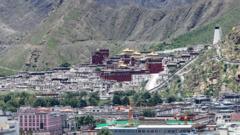A group of four British climbers conquered Mount Everest in less than a week using xenon gas to aid their acclimatization, igniting controversy within the mountaineering world and prompting investigations by the Nepalese government regarding the implications of performance-enhancing methods in extreme sports.
Innovative Use of Xenon Gas Enables Rapid Ascent of Mount Everest

Innovative Use of Xenon Gas Enables Rapid Ascent of Mount Everest
British climbers complete the challenging expedition in under a week, raising ethical questions in the mountaineering community.
Four British climbers have made headlines after scaling Mount Everest and returning to London in less than a week, a feat made possible through the use of xenon gas to assist with altitude acclimatization. Traditionally, climbers spend weeks on the mountain slowly acclimatizing to the thin air, making this rapid ascent particularly controversial. The organizers of the expedition claim that xenon, a noble gas, significantly reduced the acclimatization time, allowing the climbers to bypass the lengthy adjustment period typically required.
The rapid ascent has sparked a fierce debate in the mountaineering community and has drawn the attention of the Nepalese government, which is now investigating the implications of using xenon gas in climbing expeditions. Supporters argue that the gas could revolutionize mountaineering practices, while critics raise concerns about the ethics of “performance-enhancing” methods in what is viewed as one of the greatest challenges in sports.
Lukas Furtenbach, the expedition organizer, remarked that he plans to offer guided trips to Everest utilizing xenon gas starting in 2026, aiming to reduce the typical climb time even further. He noted that, while the use of xenon has been met with skepticism, it improves the climbers’ well-being by mitigating symptoms of altitude sickness such as nausea and headaches.
As the debate unfolds, questions arise about the future of climbing expeditions — whether ease of access through such methods will undermine the spirit of mountaineering or open the doors for more aspiring climbers who dream of reaching the summit of the world’s highest peak.
The rapid ascent has sparked a fierce debate in the mountaineering community and has drawn the attention of the Nepalese government, which is now investigating the implications of using xenon gas in climbing expeditions. Supporters argue that the gas could revolutionize mountaineering practices, while critics raise concerns about the ethics of “performance-enhancing” methods in what is viewed as one of the greatest challenges in sports.
Lukas Furtenbach, the expedition organizer, remarked that he plans to offer guided trips to Everest utilizing xenon gas starting in 2026, aiming to reduce the typical climb time even further. He noted that, while the use of xenon has been met with skepticism, it improves the climbers’ well-being by mitigating symptoms of altitude sickness such as nausea and headaches.
As the debate unfolds, questions arise about the future of climbing expeditions — whether ease of access through such methods will undermine the spirit of mountaineering or open the doors for more aspiring climbers who dream of reaching the summit of the world’s highest peak.












